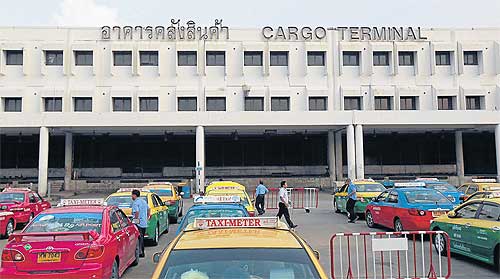Boonsong: Rice sales 'secret'
Revealing G-to-G details 'could hurt foreign ties'
Commerce Minister Boonsong Teriyapirom yesterday
remained tight-lipped over the government-to-government (G-to-G) rice
export controversy, saying details of rice sales are confidential and
cannot be released to the public.

Paddy in the hold
The disused cargo terminal at Don Mueang airport will be turned into a warehouse to store rice under the government’s rice pledging scheme. The government has denied that flaws in the scheme have resulted in huge amounts of pledged rice remaining unsold. THITIWANNAMONTHAAddressing a press conference yesterday, Mr Boonsong provided only slightly more information than he had previously. The minister was ordered by Prime Minister Yingluck Shinawatra to disclose "as much as possible" on the G-to-G deals so that the public might better understand the much-criticised pledging scheme.
Mr Boonsong reiterated his previous stance that details of the G-to-G rice deals could not be disclosed as it could affect foreign relations. He said the import of rice is a politically sensitive topic in many countries.
Mr Boonsong said 7.3 million tonnes of rice had been sold through the G-to-G deals to four countries _ Indonesia, China, Bangladesh and Ivory Coast.
Of the amount, 1.4 million tonnes had been delivered to the buyers, which accounts for 20% of the total contracted amount. Another 300,000 tonnes would be delivered between now and December, and the remaining 5.56 million tonnes would be gradually shipped out next year, he said.
Mr Boonsong insisted that the commerce ministry had paid 42 billion baht in proceeds from the sales of the pledged rice to the Bank for Agriculture and Agricultural Cooperatives (BACC). The BACC funds the rice pledging scheme through loans and direct funding.
The minister also rejected criticisms that the government had monopolised the rice market. Rice exporters, traders, millers and food processing manufacturers who use rice as a raw material could take part in the public auctions of the ministry, he said.
He also said that sales of the pledged rice were made through an ex-warehouse method, which forced the buyers to cover transport costs.
"The buyers thus have to hire private companies to check the quality of the rice and ship it out. That is why the export figure of 1.46 million tonnes showed up as being done by the private sector," Mr Boonsong said.
He said if the Commerce Ministry had not sold the rice, as alleged by the opposition party and some academics, the ministry would not have the money to return to the BACC.
Chookiat Ophaswongse, honorary president of the Thai Rice Exporters Association, said details of the G-to-G rice deals should be disclosed as they had no bearing on relations between countries.
"I believe the government gave false information when it said it released millions of tonnes of rice. It should have said that it had planned to release rice in G-to-G deals, but it still could not sell the rice and was seeking ways to sell it. The government is riding on a tiger and cannot dismount it," Mr Chookiat said.
He said that between Jan 1-Sept 30 this year, private companies exported 5.2 million tonnes of rice, or an average of 500,000 tonnes per month.
He expected that 6.5-6.7 million tonnes of rice will be exported by the end of this year, compared to the same period last year which saw 9.1 million tonnes of rice exports.
Mr Chookiat said the situation next year will worsen if the government continues to stockpile rice.
He said buyers will soon learn they can purchase rice of a similar quality from elsewhere at a lower cost, and will begin to shun Thai rice in favour of buying from rival countries.
Mr Chookiat also criticised the ex-warehouse sale method. He said it was wrong to trust private companies to take the rice first and pay later.
Mr Chookiat also took aim at the plan to store rice at a Don Mueang Airport cargo warehouse, saying the plan was clear proof of the government's mismanagement of the rice scheme.
The government needs more places to store rice because more grain has been admitted into the programme than should have been, without being released, he said.
He said the airport's cargo warehouse is unsuitable because it is normally used to store industrial products.
The grain could be damaged by moisture or insects due to lack of proper environment control, Mr Chookiat said.
He also said the airport's security consideration must also be taken into account. Allowing trucks carrying rice to move in and out of the airport could affect the airport's security, he said.

ไม่มีความคิดเห็น:
แสดงความคิดเห็น